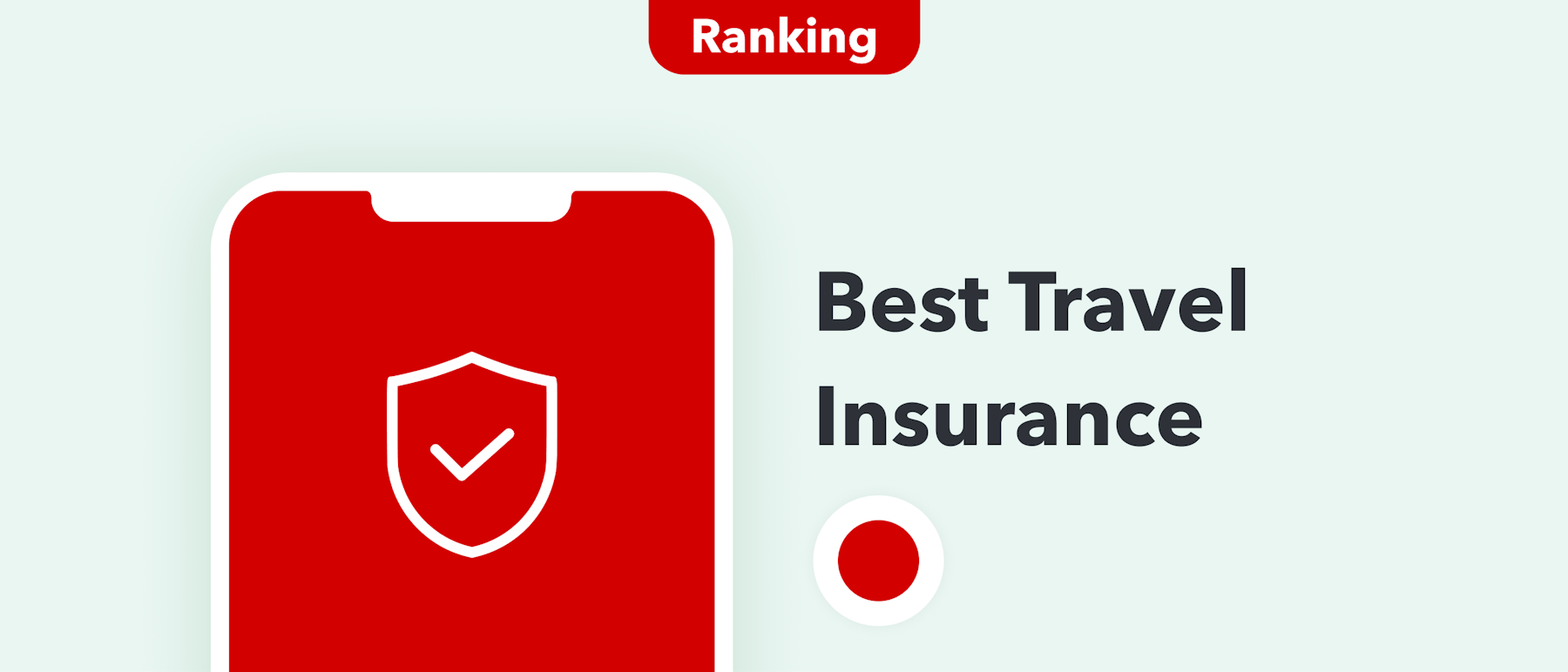 Nick Fewings
Nick Fewings How Does Travel Insurance Work in the UK? Your Definitive Guide to UK Travel Insurance in 2024

Byron Mühlberg
Guide

Monito's Managing Editor, Byron has spent several years writing extensively about financial- and migration-related topics.
Links on this page, including products and brands featured on ‘Sponsored’ content, may earn us an affiliate commission. This does not affect the opinions and recommendations of our editors.
Read moreTravel insurance is a type of insurance that covers the costs of unexpected events that may occur while you're travelling. Sounds straightforward, right? Unfortunately, there's much more to consider when purchasing travel insurance, from limits to deductibles, comprehensiveness, and much more.
For instance, if you're a twenty-year-old planning a two-month solo backpacking adventure in the jungles of Vietnam, you'll likely seek a higher deductible, lower maximum limit, and completely different set of coverage options than you would as a young family of four visiting Disneyland Paris for a long weekend. (And let's not even get started on the costs of visiting the US!) This article will explain what all of this means and more.
In our opinion, VisitorsCoverage gives you the best combination of value and comprehensiveness for travelling worldwide, offering you great deals on both health- and travel-related coverage from its online catalogue of dozens of policies. Get an online quote for your next trip in just minutes by clicking here!
In this guide, we delve into travel insurance by explaining what it is, how it works, how much it costs, and why you should strongly consider having it for your next trip abroad!
An Overview of How Travel Insurance Works
Anete Lūsiņa

Let's start with the basics — what is travel insurance?
In simple terms, travel insurance is a type of insurance that safeguards you against unexpected events that may happen while you're travelling in a foreign country. Like other insurance policies you may be familiar with, such as health insurance, car insurance, or home insurance, travel insurance requires you to pay a fee, known as a 'premium', generally monthly. In return, you are protected against a prearranged set of risks that may occur while you travel. These risks typically include medical emergencies, trip cancellations, lost or stolen luggage, repatriation, search-and-rescue, and other unforeseen circumstances.
Travel insurance can be purchased before or during a trip and usually covers a specific period, known as the 'policy period'. The cost and comprehensiveness of your travel insurance policy can vary significantly depending on the duration of your trip, your destination and the level of coverage you require. As we will find out, it is not only recommended but also essential to carefully review the terms and conditions of your policy before purchasing it to ensure that your coverage is adequate and that you understand any exclusions or limitations.
When travelling, you can file a claim with your insurer to receive reimbursement for any covered expenses, provided your claim is eligible.
To better understand how travel insurance works, let's walk through the process from purchase to filing a claim. (Note that the steps below describe online purchases — which is the easiest — but you can also buy travel insurance offline through your travel agent.)
Step 01
Find a good insurer
To find the best health insurance partner for your needs, compare providers on Monito to get an idea of what's out there and which insurer will work for you and your holiday plans.
Step 02
Enter your details
Once you've chosen an insurer, you'll need to visit their website and enter your trip details (typically your home country, destination country, and trip duration) and your personal details (i.e. your full name and date of birth).
Step 03
Review coverage options
Browse your insurer's website for different coverage options. Reviewing these options carefully is essential when selecting a policy that fits your needs and budget.
Step 04
Understand the policy
Once you've found a policy you like, read its terms and conditions from start to finish. Take careful note of the coverage limits, exclusions, and deductibles.
Step 05
Purchase the insurance
If you're happy with the terms, you can buy your insurance policy online using a credit card or bank transfer. The policy contract will arrive in your inbox shortly after payment.
Step 06
File a claim
If something happens while you're abroad that's covered by your policy, contact your insurer as soon as possible to file a claim. This is ordinarily possible via an online portal or in-app, though you usually also have the option to phone your insurer directly (good travel insurance providers are available 24/7).
Final step
Keep good records
If an unforeseen event occurs, keeping records of all expenses, including receipts and medical bills, is essential. Remember to record the incident as carefully and faithfully as possible, as your insurer will likely want to review this information too.
Why Travel Insurance is Important
Ari He

Travel insurance is important because you never know what might happen to you while you're travelling abroad. If you're like most people, going overseas, whether for a holiday, work, or anything else, is an exciting experience. However, because healthcare and travel-related expenses can be far higher than you might expect, ensuring you're covered in case of unexpected incidents is a surprisingly important step for any overseas trip.
For example, if you're an American travelling abroad, you might be surprised to learn that the average medical claim overseas is around £1,250, with doctor's visits and medical treatment usually falling between £70 and £1,500 more for most travellers.
Moreover, travel-related problems, including lost baggage, flight delays, theft, and many others, are not only severe headaches while travelling but are not as unlikely as you might think! That's why always a good idea to leave for your trip with some form of travel insurance under your belt.
Types of Travel Insurance in the UK
Holly Mandarich

There are several types of travel insurance, but they broadly fall into two categories based on what they cover:
- Trip insurance: This covers travel-related incidents, which commonly include the cancellation of transport, trip cancellation, stolen or lost luggage or valuables, repatriation to your home country in case of civil unrest or disasters, and more.
- Travel health insurance: This covers medical-related incidents, commonly including doctor and hospital visits for accidents, illness, and death, and (in more expensive policies) dental care, pre-existing conditions, maternity and childbirth, or mental health-related costs.
A good health insurance policy will include a combination of both health and trip insurance, but depending on your needs and preferences, you may want to look for one or the other. For example, if your normal health insurance in your home country already covers hospital visits overseas, then it may be a smart idea to find a trip insurance policy only.
Similarly, travel insurance can also be categorised based on the type or duration of the policy. For example:
- Single-trip insurance: This insures you for a single trip abroad, regardless of the exact duration.
- Multi-trip insurance: This insures you for multiple nonconsecutive months within a longer period (normally a year).
- Expat/digital nomad insurance: This insures you for longer periods of time while living abroad (i.e. longer than one year). See below.
- Family insurance: This insures you and multiple others in one policy.
- Business insurance: This lets businesses to insure employees travelling abroad on business trips.
While using digital nomad insurance while living abroad may be tempting, remember that many countries require residents to hold a local health insurance policy. Be sure to check on these requirements before moving to a new country.
Typical Conditions and Exclusions
As we touched on above, most health insurance policies, regardless of the type, generally include coverage for the following kinds of incidents:
- Doctor's visits (within covered limits),
- Hospital visits (within covered limits),
- Evacuation or repatriation to your home country due to natural disasters, epidemics, or civil unrest,
- Expenses for the injury of a third party or damage to their property,
- Cancellation of transport,
- Trip cancellation (for reasons outside your control),
- Stolen or lost luggage (including passports or cash),
- Stolen or lost mobile phones, cameras, clothes or jewellery.
On the other hand, some other activities and incidents are seldom covered by standard travel insurance policies, although they can sometimes be paid for at a premium. A few examples of common exclusions include:
- Mental health-related expenses,
- Pregnancy, childbirth, and maternity-related expenses,
- Chronic or pre-existing conditions (especially if not disclosed),
- Risky activities (e.g. skiing, extreme sports, etc.).
How to Use Travel Insurance in the UK
JK

Once you've purchased your travel insurance, there's little to do but to enjoy your trip! But whether you're about to buy your insurance or have already done so, here are a few additional tips:
How to Choose the Right Type
Choosing the right type of insurance depends on your needs, preferences, risk tolerance, and budget. —
First, it's always a good idea to check your primary health insurance policy in your home country to see if it covers medical expenses like hospital or doctor's visits abroad. If it doesn't (or if it does but with strict limits), you may want to consider an insurance policy with medical coverage that replaces or augments any coverage from your home insurer. Similarly, you can also check your credit card conditions to see if you're already insured for basic travel-related incidents like missed flights or cancelled transport.
Next, you'll want to consider what kind of insurance you'll need. There are three main things to understand here:
- Deductibles: This is the amount you must pay out of pocket before your insurer starts covering the costs. A higher deductible means a cheaper premium, but it also creates more expense for you if you need to visit a doctor or hospital. Deductibles are sometimes customisable before purchase, though this isn't always the case.
- Maximum limits: This is the maximum amount the insurer will pay in total for any claims you file. The higher the maximum limit, the higher the premium, and the more you're insured. Like deductibles, limits are sometimes customisable, but again, this depends on the insurer.
- Premiums: This is the amount you'll pay the insurance company monthly in exchange for the insurance you get. Your deductible, maximum limit, and the coverage options you pick will all influence the final premium you'll pay.
Generally, younger and healthier travellers opt for high deductibles and low maximum limits. This keeps down the final cost of their insurance policy. Older travellers or travellers with existing health concerns normally opt for the opposite: low deductibles and high maximum limits (not to mention more comprehensive coverage options). It's therefore important to closely consider your own individual needs, preferences, risk tolerance, and budget before picking a health insurance policy for your trip.
When to Purchase Travel Insurance
We recommend purchasing travel insurance as soon as possible after booking flights for an international trip. This is because some policies may require purchase within a specific timeframe to be eligible for certain types of coverage.
Some travel insurance providers like VisitorsCoverage and SafetyWing allow you to buy travel insurance even after you've started your trip, but this isn't the norm, so if you don't want to be limited in your options, it's best to purchase your insurance in advance of your departure.
How to File a Travel Insurance Claim
To file a travel insurance claim, you'll typically need to provide documentation describing the incident for your insurer to review. The best form of documentation is a doctor's note or a police report. Still, in some circumstances, you might need to write a report yourself, which you should always do carefully and truthfully, providing lots of detail.
You'll also need to show any bills, receipts, invoices, and card or bank statements relevant to your claim. Be ready to show the original copies. According to your policy terms, you'll very likely be expected to pay these expenses upfront yourself and then be reimbursed later once your insurer has validated the claim.
Once you have your documentation in order, you can typically submit everything at once via an online portal on your insurer's website or mobile app. If you don't have access to these devices, it's normally also possible to phone your insurer directly. Good travel insurance providers will be on standby 24/7 to receive your calls.
Your insurer will then review your claim to determine if the expenses are eligible for reimbursement based on the policy terms.
How to Cancel or Renew Travel Insurance
If you'd like to cancel, renew, extend, or modify your health insurance policy, it's usually straightforward to do. Most travel insurance providers allow you to get the job done directly via the customer portal on their website or mobile app, and the whole process usually takes no more than a few clicks.
If this option isn't available, you can call your insurer via their customer hotline. Travel insurance operators often process calls around the clock, so reaching them shouldn't be an issue, no matter your timezone.
Cost of Travel Insurance in the UK
Guilherme Stecanella

The cost of travel insurance varies dramatically. From the insurer's perspective, the premium they charge you centres around how likely you are to file a claim. From the customer's perspective, the cost is based on the coverage chosen. All of this includes factors such as:
- Your age,
- Your health profile,
- The length of your trip,
- The fact that you reside in the UK,
- Your destination country or countries (note: travelling to or through the USA raises the cost of your premium dramatically),
- The insurance provider's pricing model,
- The specific coverage you're looking for.
It's therefore tough to estimate what you can expect to pay in premiums, as the final number can vary so extensively.
However, to give a rough estimate range according to our analysis, young travellers with no health problems, high deductibles, and low maximum limits can expect to pay between £25 and £65 per month (provided they're not travelling to the US). Conversely, an older traveller with low deductibles and high maximum limits probably won't expect to pay less than £200 per month, though the final amount can still be higher.
If you're interested, here are a few estimates of average health insurance costs from other sources:
- 5% to 6% of your total trip cost (Forbes Advisor)
- £221 per month (Nerdwallet)
- £202 per month (Business Insider)
Best Travel Insurers
Jeremy Bishop

When it comes to shopping around for travel insurance plans among different providers, you'll have a lot of options. There are two groups of insurers:
- Traditional travel insurers,
- Insuretechs.
Both offer travel insurance policies that cover you while you travel, but the main difference is in the user experience. Insuretechs leverage technology to deliver more personalised, streamlined, and often more affordable policies. They focus on user experience and innovative features such as instant policy issuance, AI-powered claims processing, and mobile app integration. On the other hand, traditional travel insurance providers tend to rely more on conventional sales channels, with more rigid policies and processes and higher premiums.
VisitorsCoverage
VisitorsCoverage is an online travel insurance marketplace offering various travel insurance plans, making it easier for travellers to compare and purchase insurance based on their specific needs.
Below are a few highlights of their travel insurance:
- Type: Insuretech focusing on both medical and trip coverage
- Customer support: FAQ, live chat, phone support
- Pricing range: £20 to £120 /traveller /month
- Insurance underwriter: Lloyd's, Petersen, and others
- Best for: Value for money and overall travel and medical coverage
SafetyWing
SafetyWing is a good insurance option for younger travellers because it offers flexible but comprehensive coverage at a famously affordable price.
Here are the main highlights of SafetyWing:
- Type: Insuretech focusing on trip coverage
- Customer support: FAQ, live chat, phone support
- Pricing range: £97 to £165 /traveller /month
- Insurance underwriter: HDI Global Specialty SE
- Best for: Digital nomads, youth, long-term travellers
Insured Nomads
Insured Nomads is another very good travel insurance option, especially if you're adventurous or frequently on the go.
Below, we go through a few insurance highlights:
- Type: Insuretech focused on both medical and trip coverage
- Customer support: FAQ, live chat, phone support
- Pricing range: £65 to £340 /traveller /month
- Insurance underwriter: David Shield Insurance Company Ltd.
- Best for: Adventure seekers wanting comprehensive travel insurance
Allianz Travel
Allianz Travel Insurance is a major name among travellers. While pricier, they offer excellent coverage options and have a long record of service and an excellent reputation.
Here are the main points of Allianz's travel insurance.
- Type: Traditional insurer focused on both medical and trip coverage
- Customer support: Phone support
- Pricing range: £100 to £500 /traveller /month
- Insurance underwriter: Jefferson Insurance Company
- Best for: Older travellers looking for reputable, comprehensive coverage and don't mind the higher premiums
Best Digital Banks For Travel Insurance
Bambi Corro

In addition to traditional insurers and insuretechs, a few challenger banks offer travel insurance in their plans. Note that these cards are typically paid for every month, and the insurance is only an extra rather than a main feature: therefore, it's not nearly as comprehensive as travel insurance from an insurer.
Still, if you're looking for a new digital account and card with travel insurance as a perk, here are a few good options:
- Revolut: Revolut's Premium and Metal Account holders have access to a wide range of travel insurance benefits underwritten by Allianz Partners, including protection for overseas medical emergencies, trip cancellation, trip interruption, lost or delayed baggage, winter sports cover, and more. These plans cost £6.99 and £12.99 per month respectively.
- Monzo: Available in the UK, Monzo Premium offers travel insurance for up to 45 consecutive days underwritten by AXA that includes coverage for travel delays, medical bills up to £10,000,000, winter sports, lost valuables, and others. It costs £15 per month.
FAQ About How Travel Insurance Works
What is travel insurance and what does it cover?
Travel insurance is a type of insurance that's designed to protect you from unexpected events that may occur during an international trip. Unexpected events might include medical emergencies, trip cancellations, lost or stolen luggage, and other unforeseen incidents.
How does UK travel insurance work in a nutshell?
Travel insurance in the UK works by providing coverage for certain unexpected events that may occur during a trip. Depending on the policy, coverage may include medical expenses, trip cancellations, lost or stolen luggage, and more. If something happens that you're insured for according to your policy, you can file a claim with your insurer to receive reimbursement for covered expenses.
How does travel insurance work for pre-existing medical conditions?
In general, travel insurance doesn't cover pre-existing medical conditions, although some insurers offer coverage for pre-existing conditions at a higher premium, meaning it'll be much costlier. Once you're insured, you can then go about your travels like normal and seek medical attention for your pre-existing conditions within the limits of your policy terms.
How do travel insurance providers determine reimbursement amounts?
Travel insurance providers determine reimbursement amounts by reviewing your claim, including all bills, invoices, card statements, and medical records, to determine if you are indeed covered for the incident according to your policy terms. This process normally happens quickly, though it can take a few days for your reimbursement to reflect on your bank account if your claim is approved.
What are the different types of travel insurance?
There are several types of travel insurance, but they broadly fall into two categories based on what they cover:
- Travel insurance: This covers travel-related incidents, which commonly include the cancellation of transport, trip cancellation, stolen or lost luggage or valuables, repatriation to your home country in case of civil unrest or disasters, and more.
- Health insurance: This covers medical-related incidents, commonly including doctor and hospital visits for accidents, illness, and death, and (in more expensive policies) dental care, pre-existing conditions, maternity and childbirth, or mental health-related costs.
When should I purchase travel insurance?
We recommend purchasing travel insurance as soon as possible after you book flights for an international trip. This is because some policies may require purchase within a specific timeframe to be eligible for certain types of coverage.
How much does travel insurance cost?
Estimating what you can expect to pay in premiums is very tough, as the final number can vary dramatically. However, to give a rough estimate range according to our analysis, young travellers with no health problems, high deductibles, and low maximum limits can expect to pay between £25 and £65 per month (provided they're not travelling to the US). Conversely, an older traveller with low deductibles and high maximum limits probably won't expect to pay less than £200 per month, though the final amount can still be higher.
What are some common exclusions in travel insurance policies?
Common exclusions in travel insurance policies can include pre-existing medical conditions, injuries resulting from the influence of drugs or alcohol, mental health-related costs, and most high-risk sports and activities. Before purchasing travel insurance, it's therefore essential to review the terms and conditions of a policy carefully to understand any exclusions and limitations you'll be agreeing to.
How do I file a travel insurance claim?
To file a travel insurance claim, you'll need to provide documentation of the covered event, such as a doctor's note, bills, invoices, or (in some cases) a police report. The insurer will then be able to review the claim and determine if the expenses are eligible for reimbursement based on your policy terms.
See Our Other Travel Insurance Guides
Looking for Travel Insurance to a Specific Country?
See our recommendations for travel insurance to other countries worldwide:
Why Trust Monito?
You’re probably all too familiar with the often outrageous cost of sending money abroad. After facing this frustration themselves back in 2013, co-founders François, Laurent, and Pascal launched a real-time comparison engine to compare the best money transfer services across the globe. Today, Monito’s award-winning comparisons, reviews, and guides are trusted by around 8 million people each year and our recommendations are backed by millions of pricing data points and dozens of expert tests — all allowing you to make the savviest decisions with confidence.
Monito is trusted by 15+ million users across the globe.
Monito's experts spend hours researching and testing services so that you don't have to.
Our recommendations are always unbiased and independent.




